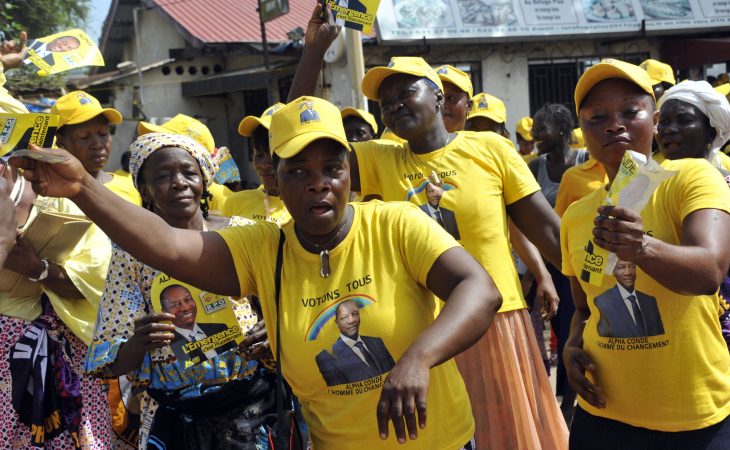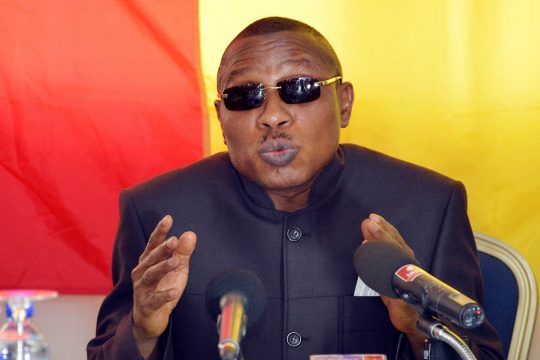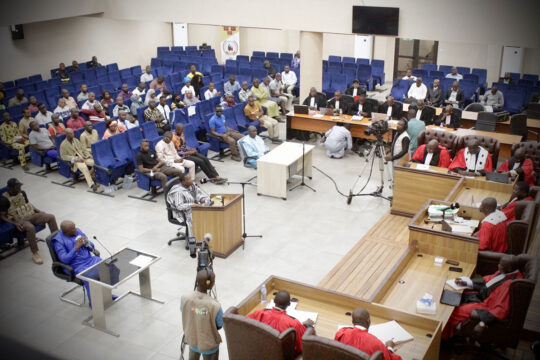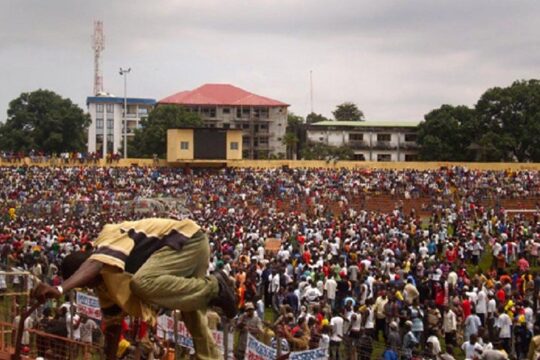Guineans are called to the ballot box this Sunday October 11 for only the second “free” presidential elections in the country’s history. Although the campaign had been relatively calm, deadly clashes broke out on Thursday after incumbent president Alpha Conde refused an opposition demand to postpone the election, which critics say is heavily rigged in his favour.
The independence of the electoral commission is being questioned. Opposition candidates are already threatening not to recognize the results, saying electoral lists have been manipulated in favour of Conde, notably by including minors.
Conde is running for a second mandate against 7 opposition candidates, including Cellou Dalein Diallo, who lost to Conde by only a short margin in the second round of the 2010 elections. The 2010 elections were marked by violence, amid ethnic and regional tensions which remain strong in this country of 11 million people. The European Union, which is deploying observers like the African Union, ECOWAS and some NGOs, this week expressed concern.
Guinea, a francophone country in West Africa, has not suffered civil war like most of its neighbours (Liberia, Côte d’Ivoire, Sierra Leone, Mali), but it is far from being a haven of stability. Despite its rich natural resources (notably bauxite) it remains among the poorest countries in the world. Despite the democratic transition of the last few years it remains plagued by corruption and bad governance. And inter-ethnic and regional problems are always simmering. Although it has more than 20 ethnic groups, Guinea has been marked by a historical rivalry between the Fulani (Peuls in French, ethnic group of Cellou Dalein Diallo) and the Malinké (ethnic group of current president Alpha Conde). The Forest region, which is situated in the extreme southeast of the country and has numerous other ethnic groups, has always been marginalized. It had a president once, Dadis Camara (2008-2009), who seized power after the death of Lansana Conte. Lansana Conte governed with an iron fist for nearly 25 years, as did Sékou Touré, the father of the country’s independence. “Dadis” is currently in exile in Burkina Faso and had wanted to run for these elections. He is indicted for grave crimes, including murders and rapes in a Conakry stadium on September 28, 2009 where his army killed some 100 opposition supporters. Nevertheless, he still enjoys some support in the Forest region. Guinea has been hard hit economically and socially by the Ebola crisis, which started in February 2014 in the Forest region.
Media were tightly controlled under Lansana Conte and private media did not emerge until the end of the 1990s. But the Guinean media are changing, and Fondation Hirondelle is present in Guinea to help develop independent news and information. We spoke to Amara Camara, editor of Studio Hirondelle Guinea, for more insight on these elections.
JusticeInfo.Net: So President Conde is running for a second term. Does he look set to win, or does the opposition have a serious chance?
Amara Camara: Given how things are going, we can’t predict a victory for Alpha Conde or for the opposition because voting here is community-based, we have to recognize that, so each of the candidates has a well-defined bastion.
JusticeInfo.Net: Is the opposition united, and are there alliances?
AC: No, there are seven candidates running against President Conde. Among the best known opposition leaders, there are at least five in the race. So there is no single opposition candidate. There are more than 100 parties in Guinea and the parties that do not have their own candidates have forged alliances with each of the 8 candidates. But for the moment, all the opposition leaders are in the race.
JusticeInfo.Net: The opposition has accused the electoral commission, the CENI, of being biased in the president’s favour. How independent is the CENI?
AC: Within the CENI there are representatives of all sides. The opposition has ten members. The party currently in power and its allies also have ten members. There are five representatives of civil society and two for the administration. So I think this composition should allow the CENI to act in an independent way. But in Guinea, there’s a crisis of confidence between the political players and everyone thinks the CENI is biased in favour of the other side. There is an institution called Afrobaromètre that has just published the results of a survey it conducted a few months ago, which found that one out of every two Guineans does not trust the CENI.
JusticeInfo.Net: Has the campaign focussed on social and economic problems, or has it been characterized rather by personalities, ethnic and regional divisions?
AC: There has been both in this campaign. Candidates or their representatives have been talking about their social policy platforms, what they want to do on the economic, political, educational or health fronts. But all of them also turn to their ethnic group or region to say such-and-such a region is my stronghold, such-and-such a community is my community. So there has been both in this election campaign.
JusticeInfo.Net: There was unrest during President Conde’s visit to the Forest region last weekend. Has there also been a “Dadis” factor hanging over this campaign?
AC: Yes, the Dadis factor has weighed in, because apart from the incumbent president, who is accused of blocking Dadis from running, all the other leaders that went to the Forest region used the Dadis case in the hope of winning support from Dadis’s community and Dadis’s supporters. Each one said they were in alliance with Dadis. There is even one party that signed a formal alliance with Dadis’s party.
JusticeInfo.Net: So opposition candidates say they are allied with Dadis or his party to get support from people in the Forest region, but Dadis is accused of serious crimes. Doesn’t that bother them?
AC: For the time being it doesn’t bother them. All’s fair in love and war, and they want first of all to win. Perhaps things will change afterwards, but for the moment, all eyes are set on the presidential seat. Now, what could be a problem is the acceptance of the results, because the political leaders all seem to be saying that if they lose, it’s because someone cheated.







